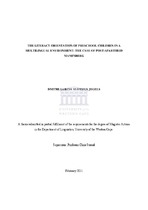| dc.description.abstract | This thesis is the result of an ethnographic study of the multilingual literacy practices of a group of families in their particular spaces within the urban context of the community of Manenberg, with the specific view of investigating the links between spatial and urban capital and the literacy practices to be encountered amongst these families. The following questions form the core of the study: 1. What are the parental ethnotheories about literacy and schooling? 2. Are there family literacy practices that may enhance preschool children’s ability to make meaning within the school system? The results of the thesis show a range of beliefs resulting in parents adopting a range of strategies in terms of language choice and literacy socialisation of their children. The thesis also shows that the vast majority of parents view acquisition of English as important, that there is a definite concern about access to libraries and about safe places for children to engage in extramural activity. Parental ethnotheories have a direct bearing on how the preschool child is oriented towards literacy. This includes implications for what languages the preschool child is exposed to, what medium of instruction parents prefer for their children (which is often not the language of highest competence of the child), whether or not various supposedly accessible resources for the promotion of children’s literacy are tapped into, and whether or not parents become actively involved in the literacy acquisition of their children. However, these findings need to be seen in the larger context of the research participants’ perceptions and discourses about space, multilingualism, and literacy. Some unexpected findings are shown as a result of listening to people’s voices on the ground. The respondents’ ethnotheories of multilingualism, space, and literacy produce narratives of local patriotism, pride in Cape Afrikaans, and of emplacement rather than displacement. Urban planning structures, whether envisaged under apartheid or by successive regimes in the post apartheid era, are shown to have become less rigid, fluid, and porous. The local moral economy works to legitimise poverty, so that living in a shack is not stigmatised, and gang members are seen to be full members of the local community, ignoring normative structures that would treat such agents in a punitive manner beyond the borders of Manenberg. Residents, though mostly impoverished and lacking in high levels of education, are shown to remain marginalised through a lack of material resources, with many in need of a strategic orientation to resources, including those which would enable them to orient their children to literacy in such a way as to enable them to make a successful transition to the school system. | en_US |

